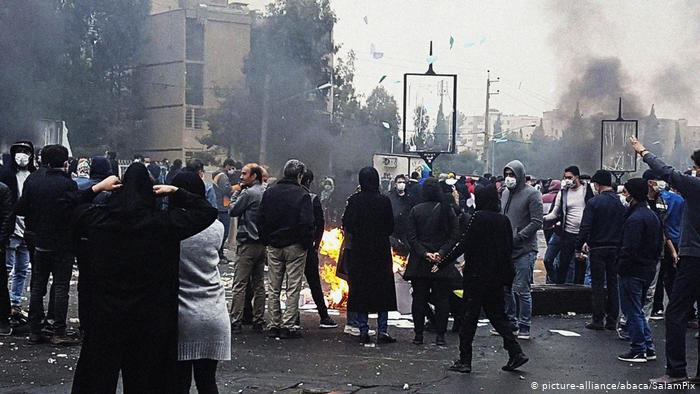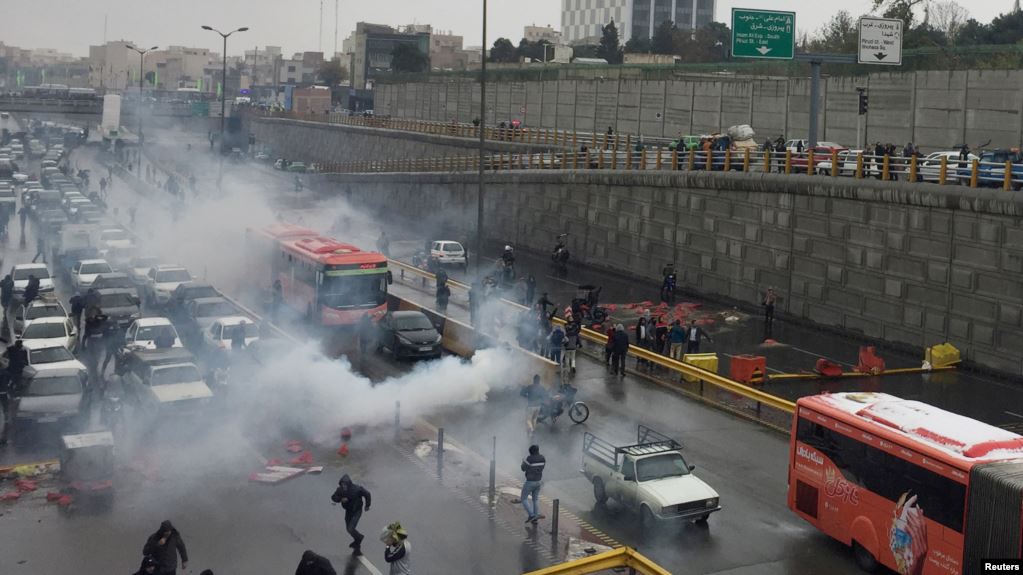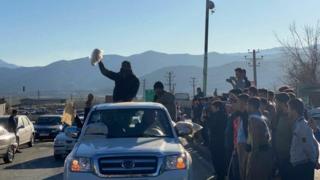
Little time for diplomacy
The editorial of Arman Melli focuses on the limited time left for a diplomatic solution to resolve the Iran-America crisis, with both countries facing significant elections in 2020.
There is not much time for solving the problems between Iran and America in the international domain. Rouhani’s government favors talk and de-escalating tensions with the world and is determined to meet this end to create economic openings for the country.
The path to diplomacy is still open since both sides express their views through mediators after a year and a half of the US withdrawal from the nuclear deal and imposing many sanctions on Iran.
However, there is an upcoming election in Iran and its results, according to predictions, will not be in favor of those who want negotiations with America. As a result of the victory of the government’s rivals in the parliamentary elections, the path for new initiatives or negotiations will be blocked, and it becomes less and less possible to resolve the issues between Iran and America through dialogue.
On the other hand, the US presidential election is getting closer. If Iran is after using diplomatic means, given the situation of Donald Trump, it will be more effective before the beginning of the serious election campaign in the United States.
As we know, any changes or developments in this regard depend on the Islamic Republic’s views towards the region. Japan could – and still can – play a significant role in this regard since both the Islamic Republic and America have positive views towards this country.
Given Japanese Prime Minister Shinzo Abe’s trip to Tehran and Hassan Rouhani’s recent trip to Tokyo, one can say that there is one thing over which both Iran and America agree: Japan’s positive role in the mediation efforts.
To see if these talks have been successful, we should wait until January which is the time for Iran to take the fifth step in reducing its obligations in the nuclear deal. If Iran takes the fifth step, then one can say that Tokyo’s talks have failed. But if there is any revision in Iran’s position, then one can hope for an opening.
Can the visit of India’s foreign minister help in solving Iran’s economic problems?
The editorial of Arman Melli focuses on why Rouhani’s recent visits to Malaysia and Japan, as well as the visit of the Indian foreign minister to Tehran, will not solve Iran’s economic problems, given the US tough economic sanction on the Islamic Republic.
India, Japan, and South Korea are the most important buyers of Iran’s oil, as they purchase 65 to 70 percent of the country’s oil. These countries owe money to Iran and it is worth mentioning that Japan’s debt to Iran amounting to $5bn. One of the reasons behind Rouhani’s trip to Japan was to unfreeze Iran’s blocked money.
Rouhani is trying to stay in his position and cover up his past failures. In his recent trip to Malaysia, he had meetings with Malaysian economic officials, but to no avail. He had similar meetings with Japanese investors, but they too are afraid of US punishments. As a matter of fact, they do not want to lose their privileged position in the American economy just to get closer to Iran.
In the meantime, there has been talk of the Indian foreign minister’s visit to Iran. It can be imagined that pretty much like Japan, India too will not be able to transfer money to Iran due to the lack of banking relations with Tehran. India’s foreign minister would certainly have raised the same concerns in his trip to Iran, stressing that the Americans do not allow India to pay its debts to Iran.
Rouhani’s efforts to create an opening in the current tough economic condition will not come to fruition. Given the positions of the Iranian regime, there is no hope for such an opening.
Ground for taking Iran’s case to the UN Security Council is being prepared due to the Europeans activating the dispute mechanism in the nuclear deal and the loss of the European Union’s support. With the position taken by the European Parliament, UN General Assembly, and the US State Department against Iran, the international atmosphere has turned against Iran.
Outcome of Rouhani’s trip to Tokyo
The editorial of Arman Melli, written by academic Sadegh Zibakalam, goes over the possible results of the Iranian President Hassan Rouhani’s recent trip to Japan.
All pieces of evidence indicate that Hassan Rouhani’s trip to Japan doesn’t seem to have been completely successful. We do not know much about the private meeting that took place between Rouhani and Shinzo Abe for an hour and a half, as neither said anything about it.
It cannot be expected that all the goals of Rouhani’s trip were achieved unless we suppose that he had gained special powers before going to Japan in order to negotiate with Abe. The Japanese prime minister is in a position to play a positive role in the Iran-America relationship – a role that the Europeans couldn’t – and Oman no longer can – play.
Unlike the Europeans who are not favored by Donald Trump or Iranian officials, Abe has a special position, as he is positively viewed by both sides. But Abe can help in breaking the ice of Tehran-Washington relations only if Rouhani can gain the Iranian establishment’s agreement to de-escalate the tensions between the two countries.
Otherwise, Rouhani’s trip to Japan must be seen in a different light. Iran hasn’t received a considerable part of its oil revenues from Japan due to the US sanctions. It is not clear how much Japan owes Iran in this regard, but if Abe can gain Trump’s agreement to pay a part of this money to Iran, it will be a positive step.
The other goal is for Abe to gain permission from Trump – as a sign of good intention – to buy some oil from Iran. The third possibility is for the Japanese to invest in Iran.
But as mentioned earlier, all these possibilities depend on Abe’s success to gain Trump’s agreement for giving such concessions to Iran. It all depends on whether there is a change in America’s approach towards Iran. Otherwise, there will not be any changes.
It seems unlikely that Rouhani would have gone to Japan without getting a green light. So now the ball is in Trump’s court: will he take a step forward or will he keep pressuring Tehran?
Adding salt to injury!
The editorial of Ebtekar is critical of the poor reaction of Iranian officials and certain experts to the recent protests – in which, according to Reuters, 1,500 people were killed.
The November protests, undoubtedly, turned into a crisis point in Iranian society. The impact of these sudden, severe, uncontrollable, and violent protests will remain with the Iranian people for years. Passage of time, perhaps, might help in healing these deep wounds.
Under these circumstances, all officials and state institutions must follow the same protocols which aim to foster peace in society once again. In addition, they must avoid polarization and mollify those who have suffered damage due to the protests. If so, it can be hoped that people’s anger will perhaps subside.
However, certain officials and experts do not seem to care about what happened in these protests and make irresponsible remarks in this regard. Some call the killing of the protesters as ‘bloodletting of the establishment.’
Such remarks show that those who make them either do not know what they are talking; or perceive a considerable part of society as mercenaries, infiltrators, or foreign agents; or are intentionally trying to avoid peace returning to society.
Viewing a considerable part of society as mercenaries, infiltrators, or foreign elements is very concerning and dangerous. When Iran’s security officials announce that there have been severe conflicts in 28 provinces of Iran – and some go so far as comparing them to world war – it shows that different groups of people have been involved in these protests. Now, how come these so-called experts dare to describe these people as mercenaries, infiltrators, or foreign elements?
If these experts try to intentionally prevent the return of peace and quiet to society, then one should see what they have in mind. If so, they are directly or indirectly at the service of the enemies of the country and trying to help them to realize their goals.
The officials and experts are expected not to add salt to injury. If they cannot heal it, they must learn, at least, how ‘not to speak’ about it!

Khamenei ordered to end the protests; 1500 people were killed
Reza Pahlavi called the Islamic Republic a “genocidal regime”

According to four Iranian officials and reliable sources, Reuter news agency says, roughly 1500 people were killed in the November protests in Iran. This massacre took place after the Iranian Supreme Leader Ali Khamenei ordered officials to immediately put an end to the protests.
After a few days of the protests, Khamenei had gathered senior security and government officials, ordering them “to do whatever it takes to stop them [the protests]”.
According to Reuters, three reliable sources from within the close circle of the supreme leader have confirmed that Khamenei issued such an order. A fourth source – an official of the Islamic Republic – also has corroborated that the order was issued by Khamenei. As such, the bloodiest incident after the 1979 revolution in Iran took place on the direct order of Ali Khamenei.
In less than two weeks from the start of the unrest beginning on 15 November, about 1500 people were killed, reports Reuters.
Based on social media and eyewitness testimonies, the protesters set fire to images of Khamenei, calling for the return of Reza Pahlavi, the exiled son of Iran’s former king, to Iran.
The fatalities, announced to Reuters by three officials in Iran’s interior ministry, include 17 teenagers and about 400 women.
In meeting with officials, Khamenei said: “The Islamic Republic is in danger. Do whatever it takes to end it. This is my order.” Three informed sources have told Reuters, “Khamenei is concerned with anger in working-class towns whose low-income voters were the pillar of support for the Islamic Republic”.
The Iranian supreme leader had told the officials present in the meeting that if they don’t immediately stop the protests, he would hold them responsible for the consequences.
In reaction to the Reuters’ report, Reza Pahlavi called for prosecuting the Islamic Republic in the International Criminal Court (ICC) in The Hague. Addressing EU members and the UN Security Council, he wrote: “This regime murdered 1500 Iranian in just a few days. Instead of begging for dialogue and trade with this genocidal regime, refer it to the ICC for prosecution.”
Opinion poll: 54% of people believe the protests will continue in future

According to an opinion poll regarding the November protests in Iran conducted in Tehran, only 15% of people were satisfied with conditions in Iran, while 54% of participants held that protests will continue in the future.
“Reformist” politician Abbas Abdi published the initial results of the poll conducted by the Iranian Student Poll Agency (ISPA) about the November protests in his Telegram channel.
According to this poll, satisfaction with the country’s conditions is at 15% which, compared to 2017, shows almost a 50% drop. Also, 52% of the participants in the poll hold that the conditions will get worse, 16% have a positive view of the future, and the rest have said that nothing will change.
According to this poll, 54% of the participants believe that the protests will continue in the future.
The poll shows that roughly 75% of the participants think that the protesters were right. 41% of the respondents hold that these protests will force the officials of the Islamic Republic to change their policies, while 49% think otherwise.
According to this poll, raising the gasoline price has not been the only cause of the November protests, with only 6% of the people saying they are concerned with the high price of gasoline.
85% of the respondents have expressed concerns about macro-economic problems, unemployment, and hopelessness towards the future.
Teenage kolbar workers buried; people chanted “Death to Dictator”

Death of Farhad Khosravi, 14, and his 17-year-old brother, Azad, raised the issue of kolbars once again. Kolbars are workers who carry goods on their backs across the borders of Iran, Iraq, Syria, and Turkey illegally. Most of them live in Iranian Kurdistan. The Kurdish provinces are among the poorest in the country.
Farhad and his brother, along with other kolbars, were trapped in an avalanche in the Sarvabad Mountains in Kurdistan province. People of the region were mobilized to find them. A few days later, the dead bodies of Farhad and his brother were found.
Two other kolbars were found while severely injured and were taken to a treatment center.
At the burial ceremony of Farhad, some people symbolically held pieces of bread in their hands to suggest that these two brothers lost their lives for merely a piece of bread. People chanted slogans in Persian and Kurdish, including “Death to the Dictator”.
According to a Kurdish human rights organization, 7 kolbars under the age of 18 were killed and one wounded in 2019. Based on this report, 6 kolbars were directly shot by the regime’s forces.
This organization has also reported that during the past 12 months, 14 kolbars also lost their lives due to hypothermia.
Widespread depression in Iran

Health Minister Saeed Namaki has complained about despair and depression in Iran, calling widespread mental disorders as a cause for alarm in society. He called for public attention to this issue. Depression, anxiety, and aggressiveness are among the most common mental disorders in Iran.
Namaki considers the mental health of individuals as the first pillar of health in society, emphasizing that there are a lot of shortcomings in the field of treating mental health. He stressed that society needs happiness and joy. Pointing to depression among Iranian citizens, he said adding fuel to despair, hopelessness, and despondency is “national treason against the country”.
About a year ago, too, Namaki had called Iran one of the most depressed countries in the world, criticizing Iran’s state TV and radio for their depressing programs.
According to the head of Iran’s Psychiatric Association, 20% of Iranian people suffer from mild to severe mental disorders. He added that people’s mental and physical health is neglected in Iran.
While depression, anxiety, and aggressiveness are the most common disorders in the country, obsessive-compulsive disorder, sleep disorders, and behavioral disorders are next. The number of women suffering from depression in Iran is twice as men.
According to the deputy head of Iran’s Psychiatric Association, the statistics show that mental disorders are more common than physical illnesses and one in four families have to deal with mental disorders.
Recently a member of the Tehran City Council launched a mental health campaign, saying that 27% of people living in Tehran suffer from mental disorders. The campaign aimed at alleviating domestic and urban violence, decreasing stress and anxiety, and creating more happiness for people particularly children.
